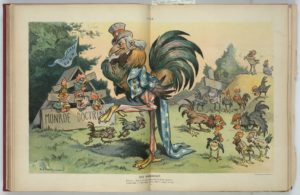
His foresight – Uncle Sam, a large rooster, stands among several small free-ranging chicks that represent Latin American nations.
While under the guidance of President Theodore Roosevelt, the U.S. manifested from the nineteenth century with major ambition to establish itself as a world superpower through imperialistic dominance and economic influence across the Western Hemisphere. Although the Spanish-American War was declared under the administration of William McKinley, Roosevelt, became the proponent figure for American imperialism at the turn of the century.
Theodore Roosevelt’s achievements drove him to the top during the pinnacle of his political career which included:
Hero of San Juan Hill, Assistant Secretary of the Navy, Vice-President, and eventually President; all making him one of the most influential and powerful political figures in government during his time.
President Roosevelt’s push on the development and growth of the U.S. Navy was a crucial point of his Political career, although his ambition of expanding American foreign policy into Central and South America would later have detrimental consequences, at the time was a key point in establishing America as a super power.
Roosevelt’s foreign policy revolved around his “big stick” notion that the strength from our naval superiority would solidify U.S. hegemony over the entire Western Hemisphere. Instead of aggressively imposing its influence with acts of military force, Theodore Roosevelt took it upon himself to implement “dollar diplomacy” that would ensure Latin nations would become economically indebted to the United States (a more peaceful way of owning them).
The U.S. actively intervened in Latin America constantly throughout Roosevelt’s time in office. Theodore Roosevelt ensured that the United States would remain as an enforcer in Cuba and Puerto Rico, even after they formally gained independence. He would later deploy his newly strengthened naval forces to ensure Panama’s independence from Colombia, in exchange for acquiring rights to the U.S. Canal Zone.
During his 1904 speech, Roosevelt proclaimed the “Roosevelt Corollary” which was similar to the Monroe Doctrine that warned European nations of the repercussions of intervening with Latin America. His reaffirmation of the Monroe Doctrine and newly coined term expanded the notion that the U.S. had the right to preemptive action, by intervening in any Latin Nation’s affairs.
With this all we had the beginning signs of American Imperialism and the United States formally beginning its conquest to establish itself as a prominent world power to reckon with.